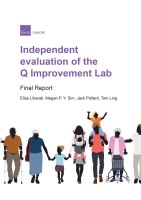| 来源类型 | Research Reports
|
| 规范类型 | 报告
|
| DOI | https://doi.org/10.7249/RR2632
|
| 来源ID | RR-2632-THF
|
| Independent evaluation of the Q Improvement Lab: Final Report |
| Elisa Liberati; Megan Sim; Jack Pollard; Tom Ling
|
| 发表日期 | 2018
|
| 出版者 | RAND Corporation
|
| 出版年 | 2018
|
| 页码 | 112
|
| 语种 | 英语
|
| 结论 |
The Q Lab approach is distinct from other health and social care improvement efforts- The Q Lab's mechanisms, particularly its convening function, and its combination of principles of collaboration, creativity, time-boundedness and topic-specificity, distinguish it from other improvement approaches.
A dedicated Q Lab team and a range of stakeholders contributed to effective delivery- Having a dedicated Q Lab team was likely essential in creating the momentum around the generation of ideas with the potential for impact. Engaging a range of stakeholders contributed to achieving a holistic understanding of the peer support challenge.
The varied engagement approach and networking opportunities were valued by Q Lab participants- The Q Lab team successfully maintained engagement throughout the pilot Lab. Participants had different motivations and faced different barriers to engagement, but valued the relationships nurtured through the Q Lab.
There were benefits as well as the potential for tension in the links with Q, the Health Foundation and NHS Improvement- The tight link between the Q Lab and Q benefitted the former, though there is a potential for tension given that membership for both initiatives is not directly linked. The financial support from the Health Foundation and NHS Improvement was vital to the Q Lab.
The Q Lab consolidated learning and knowledge on, and raised the profile of, peer support, and motivated participants to take action- Notwithstanding these achievements, participants and stakeholders felt that the Q Lab may not have been able to achieve impact and spread locally and nationally in its pilot year.
|
| 摘要 |
- The Q Lab should retain many of its core elements, as well as the tools and techniques that support the development of psychologically safe spaces for a wide range of stakeholders to meaningfully interact.
- The Q Lab team may consider changing the scope of its goals; the topic selection process; when and how it engages with different groups of stakeholders; and how to communicate what success looks like.
- Going forward the Q Lab can contribute to the evidence base, both of ideas and interventions that emerge from the Lab, but also of the effectiveness of the Q Lab approach itself.
|
| 主题 | Health Care Program Evaluation
; Health Care Quality
; Health Care Workforce
; United Kingdom
|
| URL | https://www.rand.org/pubs/research_reports/RR2632.html
|
| 来源智库 | RAND Corporation (United States)
|
| 引用统计 |
|
| 资源类型 | 智库出版物
|
| 条目标识符 | http://119.78.100.153/handle/2XGU8XDN/108897
|
推荐引用方式
GB/T 7714 |
Elisa Liberati,Megan Sim,Jack Pollard,et al. Independent evaluation of the Q Improvement Lab: Final Report. 2018.
|
|
文件名:
|
x1541644691172.jpg
|
|
格式:
|
JPEG
|

|
文件名:
|
RAND_RR2632.pdf
|
|
格式:
|
Adobe PDF
|
除非特别说明,本系统中所有内容都受版权保护,并保留所有权利。